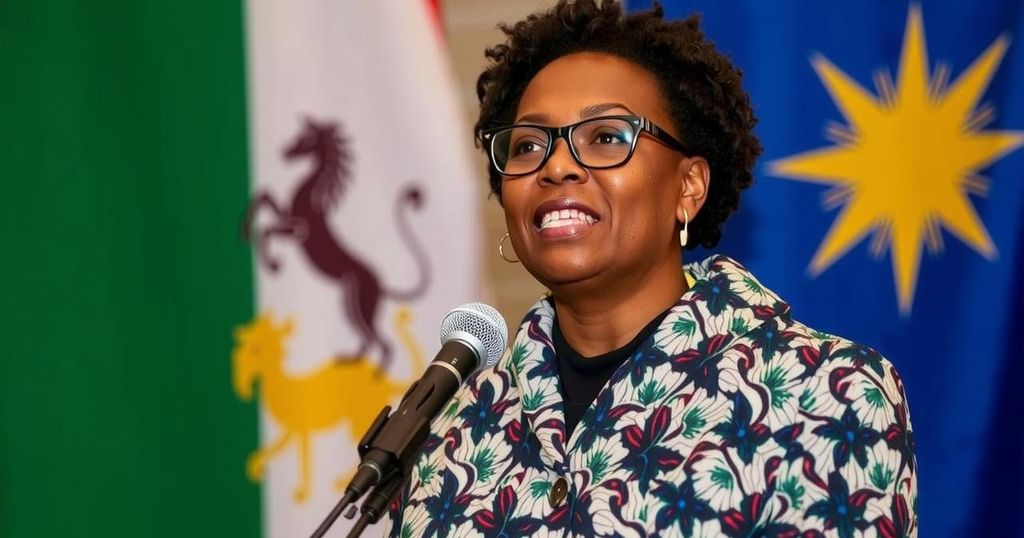Namibia Poised for Historic Presidential Election with Potential First Female Leader

Namibia is poised to elect its first female president, with Vice President Netumbo Nandi-Ndaitwah leading the polls. Approximately 1.4 million registered voters will determine the fate of SWAPO, the current ruling party, amidst its recent electoral struggles linked to corruption. If elected, Nandi-Ndaitwah promises to create jobs and enhance women’s rights. SWAPO faces competition from emerging political parties as the electoral landscape shifts in southern Africa.
Namibia may be on the verge of electing its first female president, as Vice President Netumbo Nandi-Ndaitwah seeks victory in the upcoming presidential elections set for Wednesday. Approximately 1.4 million citizens, representing nearly fifty percent of the population, have registered to participate, with fifteen political parties vying for both presidential and parliamentary positions. Early polling data indicate that Nandi-Ndaitwah and her party, the South West Africa People’s Organization (SWAPO), are currently leading the race.
Since gaining independence from South Africa in 1990, SWAPO has ruled Namibia, yet it faced significant challenges in the 2019 elections, where it lost its two-thirds parliamentary majority due to controversies surrounding corruption and money laundering in the fishing sector. Professor Henning Melber notes that these struggles signify a need for SWAPO to reconnect with younger voters who no longer resonate with its historical legacy. He argues that the party’s past may no longer afford it the same level of support from future generations.
At 72 years old, Nandi-Ndaitwah has articulated aspirations to address pressing economic issues, including a staggering 20% unemployment rate among youth. Her ambitious plan involves allocating 85 billion Namibian dollars over five years to generate upwards of 500,000 new jobs, though critics express skepticism regarding the feasibility of this initiative. Women’s issues, encompassing reproductive rights and equity in the workplace, have surfaced as vital components of the electoral discourse.
If elected, Nandi-Ndaitwah would join the ranks of African leaders like Ellen Johnson Sirleaf of Liberia and Joyce Banda of Malawi, both of whom made significant strides for female leadership on the continent. Political expert Erika Thomas advises that should Nandi-Ndaitwah ascend to the presidency, her administration should focus on transparency, accountability, and enhanced female political representation.
SWAPO faces formidable opposition from parties like the Independent Patriots for Change, under the leadership of former dentist Panduleni Itula, and the Affirmative Repositioning Party, helmed by university professor Job Amupanda. The recent electoral campaigns have wrapped up, and Namibia’s elections are poised against a backdrop of transformative political shifts in southern Africa, where various opposition parties have recently claimed victories.
The upcoming presidential elections in Namibia are historically significant, as Vice President Netumbo Nandi-Ndaitwah could potentially become the nation’s first female president. This election comes after a period of political challenges for the ruling SWAPO party, which has struggled with allegations of corruption and voter discontent since losing its dominant majority in recent years. The political landscape in southern Africa has been shifting, with several long-standing governments facing serious challenges, making this election particularly crucial not only for Namibia but for the region as a whole.
In conclusion, Namibia is on the brink of possibly electing its first female president, which would mark a pivotal moment in its political history. The challenges facing Vice President Nandi-Ndaitwah are multifaceted, including addressing youth unemployment and restoring public trust in the ruling party. The outcome of this election will not only shape the immediate future of Namibia but could also influence broader democratic trends in southern Africa.
Original Source: abcnews.go.com







